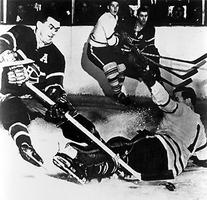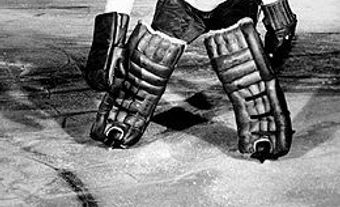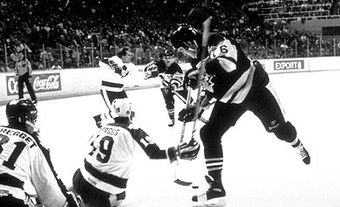Joseph-Henri-Maurice Richard, "Rocket," PC, CC, OQ, hockey player (born 4 August 1921 in Montréal, QC; died 27 May 2000 in Montréal). Known as the “Rocket,” Richard was perhaps the most iconic player in the history of the Montreal Canadiens. A member of eight Stanley Cup championship teams and a 14-time All-Star, he held close to 20 National Hockey League records when he retired, including the title for most goals scored.
Early Life and Career
The eldest of eight children, Richard was born in the Bordeaux neighbourhood of Montréal. He first played hockey with his school and neighbourhood squads. At 18, while studying to become a machinist at the Montreal Technical School, Richard played on several teams, including with an amateur club —where he scored 133 of the team’s 144 goals — and with the Junior A Verdun Maple Leafs. (Richard played under different names in order to play on multiple teams at once.) In 1940, he signed with the Montreal Senior Canadiens, the Habs’ farm team. Though his two seasons with the club were dampened by injury and he played little, his talent was not overlooked. While working for Canadian Pacific Railway’s Angus Shops (a job he worked for many summers while playing in the NHL), Richard moved up to the Montreal Canadiens for the 1942–43 season.
NHL Career
Richard led the NHL in goals five times during his 18-season career and was the league’s all-time leader in goals at the time of his retirement. He excelled under pressure: he scored 82 playoff goals, six of them in overtime; made seven playoff hat tricks; and scored 18 game-winning playoff goals. In 1944, he scored all five goals in a 5–1 win over Toronto and was named as all three of the game’s stars (a league first). Richard was a member of eight Stanley Cup champion teams with the Montreal Canadiens. He was awarded the Hart Trophy in 1947.
Richard was a success in the NHL from the outset, despite being hampered early in his career by injuries. After breaking an ankle 16 games into his rookie season, he came back the next year to score 32 goals. In 1944–45 he scored 50 goals in 50 games — an achievement which stood as a record for many years. At the same time, the “Punch Line” — composed of Richard, Hector “Toe” Blake and Elmer Lach — became one of the most celebrated trios of all time. Richard’s famous nickname — “Rocket” — was given to him by teammate Raymond Getcliffe because of the speed with which Richard streaked past everyone else during practices. (His younger brother, Henri, a teammate on the Canadiens, and himself one of the franchise’s most beloved players, came to be known as the “Pocket Rocket.”)
Fights, Suspension and the Richard Riot
Intensely competitive, Richard possessed a short temper and seldom refused a challenge or left an attack unanswered. In March 1955, after a fight broke out between Richard and Boston Bruin player Hal Laycoe, Richard went after Laycoe with his stick and struck a linesman who intervened. NHL president Clarence Campbell suspended Richard for the rest of the year, including the final three games of the regular season and all of the playoffs. This caused outrage among Canadiens fans, not least because Richard was, at the time, on the verge of winning his first points scored title. In a game at the Montreal Forum on St. Patrick’s Day, irate fans attacked Campbell, and the violence spilled into the streets in one of the worst sports riots in Canadian history. The event came to be known as the “Richard Riot.” It was indicative of the passionate devotion Richard inspired — and has since come to be seen as one of the first manifestations of awakening nationalist consciousness among the Québécois. As a result of the suspension, Richard lost the scoring championship to teammate Bernard “Boom Boom” Geoffrion. This was the closest Richard came to winning a points scored title, one of the few honours to elude him during his career. Without him in the playoffs, the Canadiens were subsequently eliminated by the Detroit Red Wings, but came back to win the next five championships in a row, with Richard as captain for the last four.
Death & Legacy
Richard's career ended in 1960 after he suffered several injuries, including a severed Achilles tendon. At the time of his retirement, he held almost 20 NHL records. His 544 goals in regular-season play was an NHL record at the time of his retirement, and his 50 goals in 50 games remained a record until broken by Mike Bossy in 1980–81. Richard was voted into the Hockey Hall of Fame in 1961, not long after his retirement, as the NHL waived its usual three-year post-retirement waiting period in order to welcome him immediately. In the same year, the Canadiens retired his number “9.” Richard was made an Officer of the Order of Canada in 1967 and a Companion in 1998. In 1999, the NHL unveiled a new trophy, the Maurice "Rocket" Richard Trophy, to be awarded annually to the league's highest goal scorer during the regular season. When Richard died in 2000 of cancer at age 78, he was given a state funeral — the first accorded to a Canadian athlete.
Despite the fact that he played his last professional hockey game more than half a century ago, Maurice “Rocket” Richard is still remembered as one of the most colorful and competitively driven players in hockey history. With his burning eyes, relentless drive and explosive goal-scoring ability, Richard was, and is, revered in Québec as a hero whose fame extended well beyond followers of his already-beloved sport.

 Share on Facebook
Share on Facebook Share on X
Share on X Share by Email
Share by Email Share on Google Classroom
Share on Google Classroom





